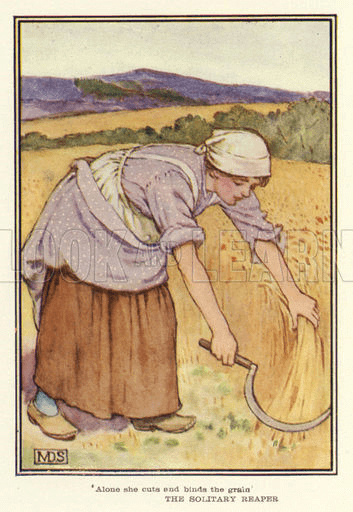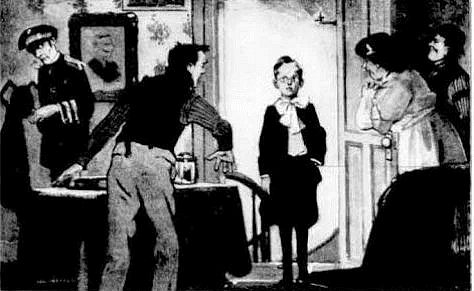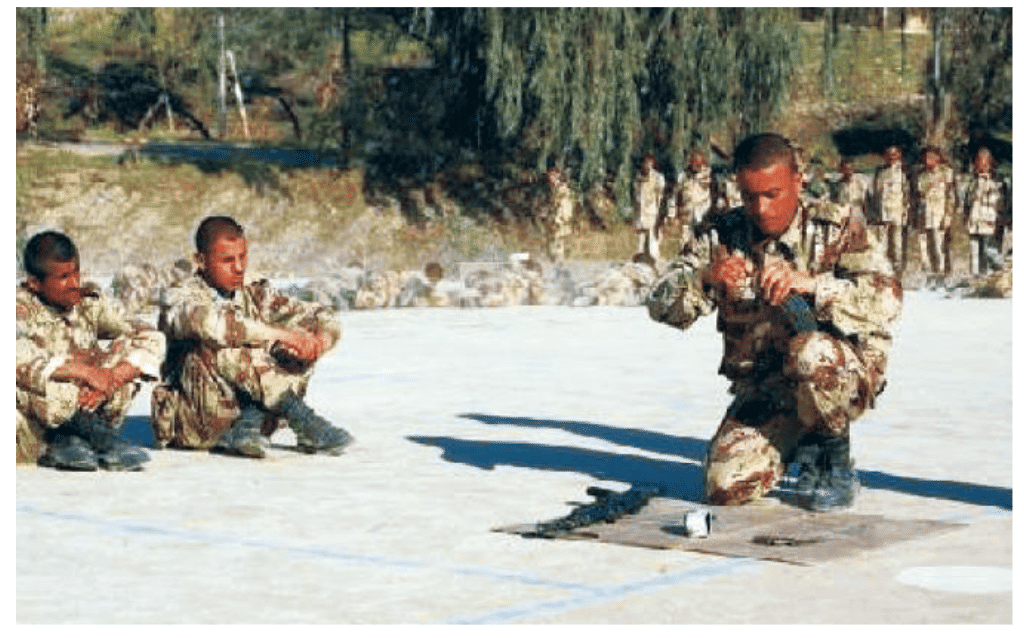About the Poet
Lord Alfred Tennyson was born in Lincolnshire, England, in 1809. He became one of the most famous poets of the Victorian era and served as the Poet Laureate for over 40 years. Tennyson is well-known for his ability to express deep emotions and beautiful imagery through his poetry. His works often reflect noble ideals and the complexities of life, making him a favourite among readers. Some of his most famous poems include “The Lady of Shalott,” “The Princess,” “Ulysses,” and “The Palace of Art.” Tennyson’s poetry is praised for its musical quality and how it paints vivid pictures in the reader’s mind. He had a unique skill in combining sounds with meanings, which made his poems not just words but also an experience for the reader. His contribution to literature helped keep poetry alive in a time when novels were becoming more popular. Tennyson passed away in 1892, but his poetry continues to be celebrated today.
Key Points of the Poem
- The poem is titled “The Brook” and is written by Alfred Lord Tennyson.
- It contains a total of 6 stanzas, each describing the journey of a brook.
- The brook represents the flow of life and nature, constantly moving and changing.
- The poem emphasizes the idea of permanence versus impermanence, highlighting how while people come and go, nature continues its course.
- Tennyson uses vivid imagery and sound devices to create a musical quality that reflects the brook’s movement.
Theme/ MessageThemes
- The Continuity of Nature: The brook flows continuously, symbolizing the unending cycle of nature. It moves through landscapes, overcoming obstacles, and remains a constant presence regardless of human activities.
- Impermanence of Human Life: The poem contrasts the brook’s eternal journey with the fleeting nature of human existence. People come and go, but the brook continues its path, highlighting how life is temporary.
- The Beauty of Nature: Tennyson captures the beauty of the natural world through detailed descriptions of the brook’s surroundings, creating a sense of wonder and appreciation for nature.
Message
- Life Goes On: The repeated lines about men coming and going reinforce the message that life continues. While humans may face challenges and changes, nature remains a steady force.
- Connection with Nature: The poem encourages readers to connect with nature and appreciate its beauty. It reminds us to take time to observe the world around us and find joy in its simplicity.
- Resilience: The brook’s journey through various terrains symbolizes resilience and adaptability. It teaches us that, like the brook, we should keep moving forward despite obstacles.
Detailed Summary
I come from haunts of coot and hern;
I make a sudden sally
And sparkle out among the fern,
To bicker down a valley.
In this first part of the poem, the poet tells us about a river. The river says that it comes from places where special birds like “coot” and “hern” (which is another name for a heron) live. Imagine a beautiful place where birds are flying around. The river then suddenly comes out, like when you jump out from behind something to surprise your friend. It shines brightly as it moves through the green ferns (the soft, leafy plants). The river flows down into a valley, which is like a big dip in the land. So, we can picture a lovely scene where the river is happily rushing through a beautiful place, making it feel alive and exciting.
By thirty hills I hurry down,
Or slip between the ridges,
By twenty thorpes, a little town,
And half a hundred bridges.
In the second part, the river continues to describe its journey. It says it moves quickly down thirty hills, which are like small mountains. The river is in a hurry, just like when you want to get to the playground quickly. It also “slips” between ridges, which are the tops of small hills. As it flows, it passes by twenty little villages called “thorpes,” which are cozy places where people live. The river also talks about crossing many bridges, about fifty of them! These bridges help people and cars get across the river. This stanza shows us how the river travels through many different places, meeting lots of things along the way.
Till last by Philip’s farm I flow
To join the brimming river,
For men may come and men may go,
But I go on for ever.
Here, the river tells us that it finally reaches a place by Philip’s farm. A farm is a place where people grow food and take care of animals. The river is getting ready to join another big river. The river then says something very important: people, like men and women, come and go in life; sometimes they stay for a short time and sometimes for a long time. But the river is different; it keeps flowing forever, never stopping. This means the river is always moving and will continue to exist even when people change. It’s like a reminder that nature goes on no matter what happens with people.
I chatter over stony ways,
In little sharps and trebles,
I bubble into eddying bays,
I babble on the pebbles.
In this part, the river describes the sounds it makes while flowing over stones. When it flows over rocks, it makes a “chattering” sound, like when you talk a lot and quickly with your friends. The river makes little musical noises, like “sharps and trebles,” which are high-pitched sounds. It also mentions bubbling into “eddying bays,” which are small areas where the water goes round and round in circles. The river then says it “babble[s] on the pebbles,” which means it makes gentle sounds as it flows over small round stones. This stanza makes us feel the liveliness of the river, as if it’s full of joy and music as it travels along.
With many a curve my banks I fret
By many a field and fallow,
And many a fairy foreland set
With willow-weed and mallow.
Now, the river talks about how it twists and turns, making curves along its banks, which are the sides of the river. It goes by many fields, which are wide-open spaces where crops grow, and “fallow” lands, which are empty fields waiting to be planted again. The river also mentions “fairy forelands,” which are magical-looking places near the river, filled with pretty plants like willow-weed and mallow. This stanza paints a picture of a beautiful landscape, showing us how the river is surrounded by nature and how it makes everything look lovely and special.
I chatter, chatter, as I flow
To join the brimming river
For men may come and men may go,
But I go on for ever.
Here, the river repeats that it keeps chattering as it moves to meet the big river. It reminds us again that while people might come and go in life, the river will keep flowing endlessly. This repetition emphasizes the idea of the river’s eternal journey, making it feel even more important. The river is like a friend who is always there, no matter what life brings.
I wind about, and in and out,
With here a blossom sailing,
And here and there a lusty trout,
And here and there a grayling,
In this stanza, the river describes how it meanders, or moves in a winding way, going in and out through the landscape. It sees flowers floating on the water, which are called blossoms, and it mentions fish like trout and grayling swimming here and there. Trout are strong, lively fish, and grayling are a type of fish that live in clean rivers. This creates a lively image of nature, where everything is busy and happy. The river is full of life, with plants and animals coming together, making it a joyful scene.
And here and there a foamy flake
Upon me, as I travel
With many a silvery waterbreak
Above the golden gravel,
The river continues to describe itself, saying that sometimes it has little white bubbles, called “foamy flakes,” on its surface as it moves. These bubbles appear as it travels along. The river also talks about “silvery waterbreaks,” which are places where the water splashes and shines like silver as it flows over the smooth stones. The “golden gravel” refers to the shiny little rocks at the bottom of the river. This stanza adds to the beauty of the scene, showing us how the river sparkles and shines with the light, making it feel magical.
And draw them all along, and flow
To join the brimming river
For men may come and men may go,
But I go on for ever.
Here, the river says it carries everything along with it as it flows to join the big river. This means it takes all the lovely things like blossoms and fish with it on its journey. The river repeats that while people may come and go in life, it will continue to flow forever. This reinforces the idea of the river’s endless journey, stressing that it is a constant presence in nature.
I steal by lawns and grassy plots,
I slide by hazel covers;
I move the sweet forget-me-nots
That grow for happy lovers.
In this stanza, the river describes how it flows gently by lawns (which are grassy areas) and small grassy places called plots. It slips past hazel bushes, which are plants with soft leaves. The river also talks about moving the forget-me-nots, which are pretty little blue flowers. These flowers are special because they remind lovers of their happy times together. This part of the poem shows us how the river is part of love stories and happy moments, making it feel warm and friendly.
I slip, I slide, I gloom, I glance,
Among my skimming swallows;
I make the netted sunbeam dance
Against my sandy shallows.
Now, the river continues to describe itself, saying it slips and slides around, moving quickly and playfully. It mentions “gloom” and “glance,” which means it can be dark and shiny too, depending on how the light hits it. The river sees swallows, which are birds that fly quickly above the water, skimming just above the surface. The river makes the sunlight dance on it, which means when the sun shines, it creates beautiful sparkles on the water. The sandy shallows are the parts where the water is shallow and has sandy bottoms. This stanza makes the river seem lively and happy, as it plays with the light and the birds around it.
I murmur under moon and stars
In brambly wildernesses;
I linger by my shingly bars;
I loiter round my cresses;
In this final part, the river whispers softly at night, under the moon and stars. It flows gently through wild, untouched places called wildernesses, which are natural areas where people don’t go much. The river takes its time at its “shingly bars,” which are places with small stones along its banks. It also hangs around “cresses,” which are a type of water plant that grows near rivers. This stanza adds a quiet, peaceful feeling to the poem, showing us how the river is calm and beautiful at night, surrounded by nature and stars.
And out again I curve and flow
To join the brimming river,
For men may come and men may go,
But I go on for ever.
Finally, the river says that it curves and flows out again to meet the big river. It repeats once more that while people come and go, it will keep flowing forever. This ending brings the poem full circle, reminding us of the river’s endless journey and its connection to nature. It leaves us with a sense of continuity and the beauty of nature that never stops, even when people change or leave.
Difficult Words
- Haunts: Places where animals live or frequent.
- Sally: A sudden charge or an adventurous journey.
- Brimming: Filled to the top, overflowing.
- Eddy: A circular movement of water, creating a small whirlpool.
- Fret: To move or flow in a way that creates curves or waves.
- Thorpes: Small villages or hamlets.
- Willow-weed: A type of plant that often grows near water.
- Mallow: A flowering plant that grows in moist areas.
- Glance: To quickly look at something.
- Murmur: A soft, low sound, like gentle speech or flowing water.
- Brambly: Covered with thorny bushes or brambles.
- Shingly: Covered with small stones or gravel.
- Cresses: Water-loving plants that often grow in shallow water.
- Silvery: Shiny and light-colored, resembling silver.
- Forget-me-nots: Small, blue flowers symbolizing true love and remembrance.




